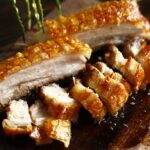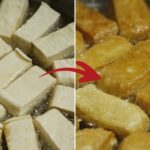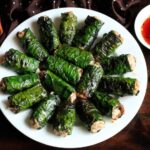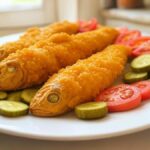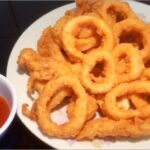Starting with the Right Ingredients: Choosing the Right Type of Lard Makes a Big Difference
Not all pork fat will give you a clear, golden broth or crispy cracklings. For a delicious and clean result, opt for back fat or belly fat – these areas have a high fat content with less connective tissue, less water, and will melt more evenly, reducing the risk of splattering.
A little trick passed down from homemakers is to marinate the fat with a little salt and minced shallots before frying for about 10 minutes. This naturally removes the pungent odor of pork fat and adds a wonderful aroma to your rendered lard.
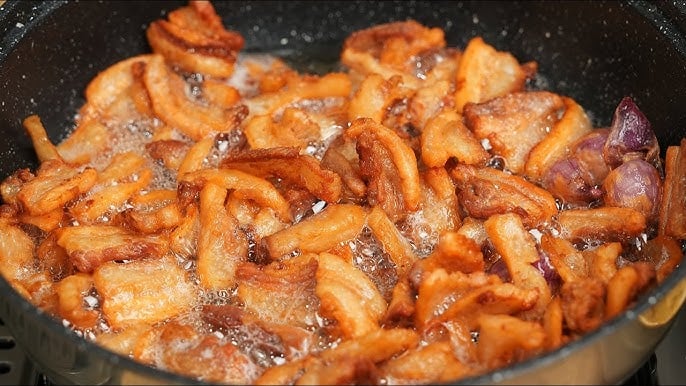
Parboiling: The Secret to Less Splattering and Odor Control
If the sound of popping fat scares you, this is the trick you need. Parboiling the fat before frying not only reduces excess fat but also makes the process much safer and more comfortable.
It’s simple: cut the fat into small, bite-sized pieces, and place them in a pot of boiling water with a pinch of salt for about 5-7 minutes until they firm up. Then, drain and let them air dry before frying. By removing excess water and fat, there will be less splattering and smoke, keeping your kitchen airy and pleasant.
Frying the Fat: Achieving Crispiness and Avoiding a Mess
The key to successful frying lies in three factors: equipment, temperature, and technique.
- Equipment: Use a deep, non-stick pot or a pan with a splatter guard. This will help the fat melt evenly and reduce mess.
- Temperature: Avoid high heat. Frying the fat over medium to low heat will allow the fat to render slowly, preventing burning and reducing the intensity of popping.
- Technique: Always stir continuously, maintain a safe distance, and if using a splatter guard, keep it on. You’ll notice a significant difference: evenly golden and crispy cracklings without the oily shower from splattering fat.
Odor Control During Frying: Keeping Your Home and Hair Fresh
One of the concerns of frying fat is the lingering odor that clings to hair and clothing. To address this, try a folk remedy that works wonders: add a few slices of fresh ginger, dried orange peel, or crushed lemongrass to the pan during frying.
These natural ingredients effectively neutralize the odor of animal fat and leave your kitchen smelling pleasant. Combined with open windows, a range hood, or a small bowl of vinegar near the stove, you can say goodbye to stubborn odors.
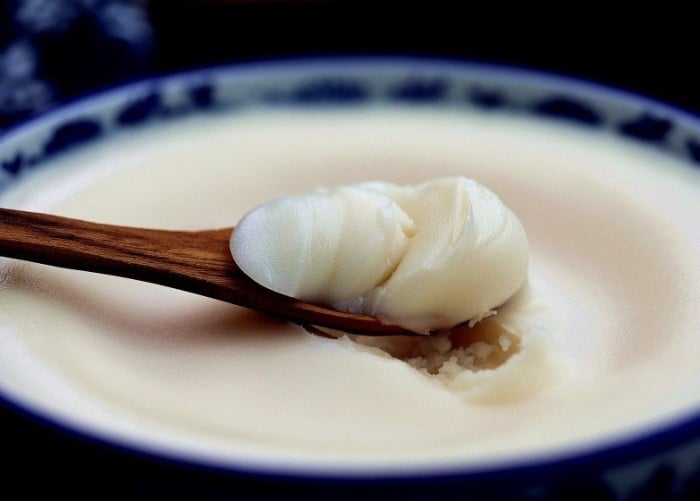
Proper Storage for Long-Lasting Rendered Lard
Once you’ve finished frying, let the lard cool down, and then strain it through a fine sieve or cheesecloth to remove any sediment and cracklings. Pour the clear fat into a clean glass jar, seal it tight, and store it in the refrigerator. Your lard will stay fresh and flavorful for 2-3 weeks.
Note: Avoid leaving lard at room temperature for extended periods, especially during summer. It may turn rancid and affect your health when consumed.
Ms. Thanh Mai, a homemaker from Ho Chi Minh City, shares her experience: “I used to dread frying fat because of the heat and mess. But ever since I started parboiling and adding ginger to the pan, the task has become so much easier. There’s also no more lingering odor in my house.”
Frying fat, when done right, not only results in delicious, crispy cracklings but also keeps your kitchen clean, tidy, and pleasant. While these tips may not be new, they are treasured secrets passed down from generations of Vietnamese homemakers.
The Ultimate Guide to Crispy Cha La Lot: A Tasty Treat That’s Hard to Resist
With the following recipe, you can create a delicious and visually appealing dish of Vietnamese beef sausage wrapped in betel leaves. This mouth-watering delicacy is a feast for the senses, with its vibrant colors and aromatic flavors. A true culinary masterpiece that will impress both your eyes and your palate!
























